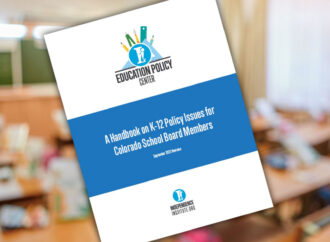EDUCATION – Issue Backgrounders
- Home
- EDUCATION – Issue Backgrounders

2023 Handbook on K-12 Policy Issues for Colorado School Board Members0
- October 16, 2023
One of the Education Policy Center’s primary goals is to educate local education leaders about important education policy issues, thereby equipping them to make intelligent, well-informed decisions in their school districts. Biennially, we update our K-12 policy issues school board member handbook to provide leaders with historical and current information from a common-sense perspective on
READ MORE
2021 Handbook on K-12 Issues for Colorado School Board Members0
- November 2, 2021
One of the Education Policy Center’s primary goals is to educate local education leaders about important education policy issues, thereby equipping them to make smart, well-informed decisions in their school districts. As part of that effort, the Education Policy Center staff provide biennial education policy briefings to all interested school board candidates, regardless of political
READ MORE

The Truth About Class Size Reduction: Problems, Examples, and Alternatives0
- April 15, 2014
Throughout the United States, class size reduction (CSR) is heralded as an effective way to improve academic outcomes. However, the research surrounding the effects of CSR is inconclusive at best. It is often difficult to determine the reliability of the studies conducted on the topic, and much of the research wavers between small, temporary academic gains in certain student groups and no gains at all.
READ MORE
Amendment 66: Unfair and Overpriced0
- August 28, 2013
Amendment 66 on the November 2013 Colorado ballot proposes a nearly $1 billion statewide income tax increase to pay for a new school finance formula and other education funding priorities. A majority vote at the polls would activate the policy changes in Senate Bill 213, approved by the legislature’s Democratic majority and Gov. John Hickenlooper. The policy package tied to approval of the tax increase proposal raises four primary concerns.
READ MORE
Greeley Public Schools: Learning Reimagined0
- July 23, 2013
Yielding unacceptable results for a challenging population of nearly 20,000 enrolled students while receiving nearly $9,000 per student, leaders in Greeley Public Schools face a timely opportunity to transform the district’s educational approach, to successfully reimagine learning and the surrounding systems and infrastructure.
READ MORE


